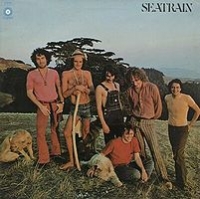Seatrain
 Seatrain was an American roots fusion band based initially in Marin County, California, and later in Marblehead, Massachusetts. Seatrain was formed after the breakup of the Blues Project in 1969. The group, which recorded four albums, disbanded in 1973.
Seatrain was an American roots fusion band based initially in Marin County, California, and later in Marblehead, Massachusetts. Seatrain was formed after the breakup of the Blues Project in 1969. The group, which recorded four albums, disbanded in 1973.Flutist/bassist Andy Kulberg and drummer Roy Blumenfeld of Blues Project formed the band with Jim Roberts, ex-Mystery Trend guitarist John Gregory, former Jim Kweskin Jug Band violinist/fiddler Richard Greene, and saxophonist Don Kretmar. Seatrain recorded their first album, Planned Obsolescence, in 1968, but had to release it as a Blues Project album for contractual reasons. In 1969, they released a self-titled LP (Sea Train), but faced a major change in membership a few months later.
The group's second self-titled album was released in 1970 under the single-word name Seatrain. By then, Blumenfeld, Gregory, and Kretmar had been replaced by drummer Larry Atamanuik, keyboardist Lloyd Baskin, and Earth Opera guitarist Peter Rowan. The album's "13 Questions" was released as a single and became a minor hit in the US, reaching #49 on Billboard's national chart. Other outstanding cuts include a cover of Lowell George's "Willin'", the vocally splendid "Out Where The Hills", the biblically-based "Song of Job", and a raucous electric version of the fiddle classic "Orange Blossom Special".
George Martin produced the album, marking the first time he had acted in that capacity with a rock act since his work with the Beatles. He also produced Seatrain's much-anticipated follow-up album, Marblehead Messenger. However, Rowan and Greene left the band soon after to form Muleskinner, while Roberts and Atamanuik joined the backing band of Emmylou Harris. Kulberg and Baskin replaced these members with guitarist Peter Walsh, keyboardist Bill Elliot, and drummer Julio Coronado, but only released one more album, 1973's Watch.
 Seatrain Latest Sheets Feed
Seatrain Latest Sheets Feed Seatrain Latest Requests Feed
Seatrain Latest Requests Feed
Advertisement
Advertisement
Total 1 sheet(s) found, listing between 0 - 1.
| Song | Added By | Pages | Instruments | Sheet Type | File |
| Seatrain |
Wijnand (27)
5220d ago
|
89 | Guitar, Vocal | Original |
|

